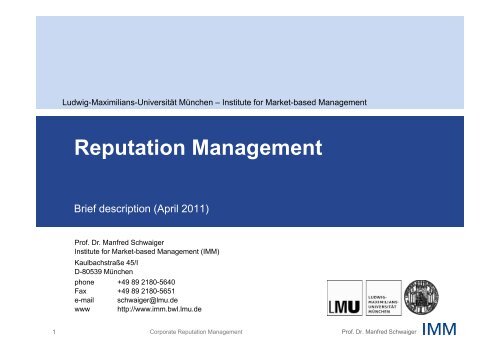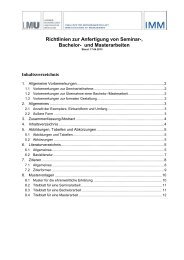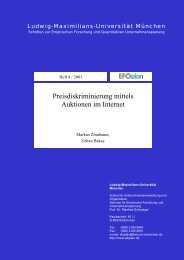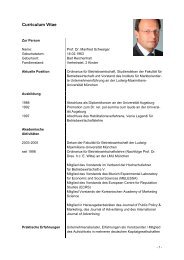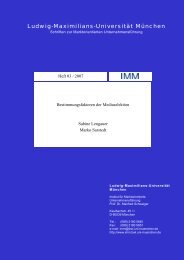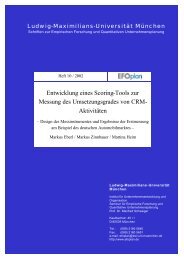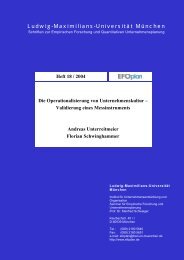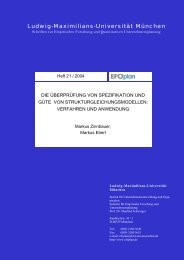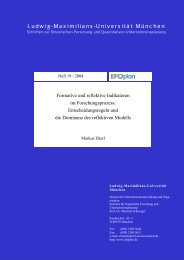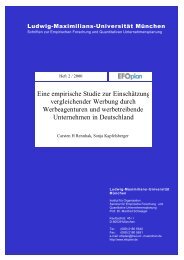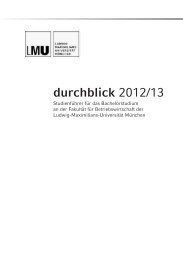Reputation Management - LMU
Reputation Management - LMU
Reputation Management - LMU
Create successful ePaper yourself
Turn your PDF publications into a flip-book with our unique Google optimized e-Paper software.
Ludwig-Maximilians-Universität München – Institute for Market-based <strong>Management</strong><br />
<strong>Reputation</strong> <strong>Management</strong><br />
Brief description (April 2011)<br />
Prof. Dr. Manfred Schwaiger<br />
Institute for Market-based <strong>Management</strong> (IMM)<br />
Kaulbachstraße 45/I<br />
D-80539 München<br />
phone +49 89 2180-5640<br />
Fax +49 89 2180-5651<br />
e-mail schwaiger@lmu.de<br />
www http://www.imm.bwl.lmu.de<br />
1 Corporate <strong>Reputation</strong> <strong>Management</strong><br />
Prof. Dr. Manfred Schwaiger
Ludwig-Maximilians-Universität München – Institute for Market-based <strong>Management</strong><br />
1. <strong>Reputation</strong> as<br />
a <strong>Management</strong> Objecti Objective e<br />
2 Corporate <strong>Reputation</strong> <strong>Management</strong><br />
Prof. Dr. Manfred Schwaiger
A company‘s market value can hardly be derived from<br />
tangible assets… assets<br />
S&P 500 (1980-2010) HDax (1980-2010) **<br />
*<br />
Sources:<br />
Ballow/Burgman/Roos/Molnar: “A New Paradigm for Managing Shareholder Value, July 2004, p. 7<br />
Lev: Intangibles: <strong>Management</strong>, Measurement, and Reporting,” Brookings Institution Press, 2001<br />
Lev: Remarks on the Measurement Measurement, Valuation Valuation, and Reporting of Intangible Assets. Assets Economic Policy Review Review, Sept Sept. 2003<br />
Thomson Reuters Datastream<br />
* 2000-2007<br />
** HDAX contains stocks of 110 largest, publicly listed corporations in Germany (DAX, MDAX, TecDAX)<br />
3 Corporate <strong>Reputation</strong> <strong>Management</strong><br />
Prof. Dr. Manfred Schwaiger<br />
*
… the central intangible asset is a company‘s<br />
corporate t reputation t ti<br />
<strong>Reputation</strong>: general evaluation of a company by its various stakeholders<br />
stakeholders.<br />
Incorporates both, cognitive and emotional components.<br />
An assessment of reputation is based on factual experiences as well<br />
as on perceptions relying on communicated messages.<br />
Products & Services<br />
Strategy & Innovation<br />
Manager & Employees<br />
Performance & Market pos.<br />
CSR & Fairness<br />
…<br />
Corporate<br />
Communications<br />
<strong>Reputation</strong><br />
Sources: Schwaiger/Cannon 2004, Sobol et al. 1992 ; Fombrun 1996; Gray/Ballmer 1998; Hall 1992; De Quevedo 2001 ; Tucker/Melewar 2005<br />
4 Corporate <strong>Reputation</strong> <strong>Management</strong><br />
Prof. Dr. Manfred Schwaiger
Companies build competitive advantages and increase their<br />
market k t value l by b fostering f t i reputation t ti<br />
<strong>Reputation</strong><br />
Media Media<br />
Customers Employees Investors Politicians Suppliers<br />
Trust in products Win war for talents Better access to Advantages in Lower<br />
and advertising<br />
Retention<br />
Higher purchase<br />
rates<br />
Willingness to<br />
apply<br />
Salary premium<br />
Better retention<br />
capital markets<br />
Lower credit<br />
costs<br />
Increased<br />
Price premium Higher productivity willingness to buy<br />
and hold shares<br />
and stocks<br />
negotiations<br />
Favorableness<br />
and support<br />
Reduced risk of<br />
litigation<br />
procurement<br />
costs<br />
Higher<br />
commitment<br />
Sources: Fombrun/van Riel 1998; Goldberg/Hartwick 1990; Lafferty/Goldsmith 1999; Caminiti 1992; Preece et al. 1995; Klein/Leffler 1981; Milgrom/Roberts<br />
1986; Dowling 1986; Eidson/Master 2000; Nakra 2000, Brown 1997; Cordeiro/Sambharya 1997; Deephouse 1997; Fombrun 1996; McMillan/Joshi<br />
1997; Roberts/Dowling 1997; Srivastava et al. 1997<br />
5 Corporate <strong>Reputation</strong> <strong>Management</strong><br />
Prof. Dr. Manfred Schwaiger
<strong>Reputation</strong> p drives financial performance<br />
p<br />
Regression analysis using reputation and stock data show:<br />
Investments in reputation-building activities over a longer period show a<br />
positive impact on the shareholder value (market value)<br />
(“I (“Investment t t Effect“). Eff t“)<br />
The overall reputation depends on innovative and communicative capabilities<br />
as well as on finance based influence<br />
(“Performance Effect“).<br />
Sources: Eberl/Schwaiger 2005; Roberts/Dowling 2002; Schwalbach 2000; Hildebrandt/Schwalbach 2000<br />
Investments <strong>Reputation</strong> Market value <strong>Reputation</strong><br />
Investment<br />
Performance<br />
Effect Effect<br />
6 Corporate <strong>Reputation</strong> <strong>Management</strong><br />
Prof. Dr. Manfred Schwaiger
<strong>Reputation</strong> p champions p outperform p the DAX-30 index<br />
Price index (basis = 100)<br />
200<br />
Risk: DAX =101 = 1.01<br />
(daily basis)<br />
Top 25% <strong>Reputation</strong> DAX<br />
175 156<br />
150<br />
125<br />
100<br />
75<br />
114<br />
Difference in index points<br />
50 0<br />
Dec-05 Mar-06 Jun-06 Sep-06 Dec-06 Mar-07 Jun-07 Sep-07 Dec-07 Mar-08 Jun-08 Sep-08 Dec-08 Mar-09 Jun-09 Sep-09 Dec-09 Mar-10<br />
Corporate reputation data:<br />
Source: IMM Corporate <strong>Reputation</strong> Monitor©<br />
9 waves analyzed: 2005-12, 2006-06, 2006-12, 2007-06, 2007-12, 2008-06, 2008-12, 2009-06, 2009-12<br />
Sample size ranges between 26 to 28 DAX firms<br />
During each wave a representative sample of the German general public was surveyed<br />
Stock market data:<br />
Source: Datastream<br />
Period: 30/12/2005 – 31/3/2010<br />
Dividends included<br />
Weighting schemes: DAX stocks are weighted by market value; reputation portfolio stocks are weighted equally<br />
(Note: similar results for market value weighting)<br />
7 Corporate <strong>Reputation</strong> <strong>Management</strong><br />
Prof. Dr. Manfred Schwaiger<br />
60<br />
30
A lack of reputation p can be fatal …<br />
June 28 28, 2007: Fire in the transformer building in a<br />
nuclear power plant in Germany, malfunction of the<br />
power grid → shutdown of both reactors<br />
July 16, 2007: Head of the nuclear energy division<br />
and Head of Corporate Communications have to<br />
resign<br />
July 27, 2007: commission of independent experts<br />
is installed by Vattenfall (among them the former<br />
BMW‘ BMW‘s Head H d of f Corporate C t Communications<br />
C i ti<br />
(budget: 7,5 Mio. $)<br />
„The The shutdown of the plants has burdened the<br />
profit by $ 85 Mio.“<br />
(Vattenfall Europe, interim report Nov. 2007). Source: Spiegel<br />
8 Corporate <strong>Reputation</strong> <strong>Management</strong><br />
Prof. Dr. Manfred Schwaiger
The other end of the scale: Nestlé<br />
9 Corporate <strong>Reputation</strong> <strong>Management</strong><br />
Prof. Dr. Manfred Schwaiger
Ludwig-Maximilians-Universität München – Institute for Market-based <strong>Management</strong><br />
2. Our Approach of Corporate<br />
<strong>Reputation</strong> <strong>Management</strong><br />
10 Corporate <strong>Reputation</strong> <strong>Management</strong><br />
Prof. Dr. Manfred Schwaiger
Our reputation model is based on a multinational study and<br />
hhas been b adopted d t d by b several l blue bl chip hi companies i<br />
Source: Schwaiger, M. (2004):<br />
Components and Parameters of<br />
CCorporate t R<strong>Reputation</strong> t ti – an EEmpirical i i l<br />
Study, in: Schmalenbach Business<br />
Review, Vol. 56, S. 46-71<br />
11 Corporate <strong>Reputation</strong> <strong>Management</strong><br />
Prof. Dr. Manfred Schwaiger
<strong>Reputation</strong> is not a goal in itself. It has to be linked to<br />
iimportant t t outcomes t and d enable bl their th i management! t!<br />
Check implementation.<br />
implementation<br />
Media response o.k.?<br />
Effectiveness and efficiency<br />
as expected?<br />
Feed drivers! Improve TQM,<br />
Performance, set up CSR<br />
strategy.<br />
Create facts and drive<br />
perception (Corp. Comm.)<br />
<br />
<br />
Controlling<br />
Acting<br />
<br />
Outcome<br />
(e.g. Loyalty,<br />
Engagement,<br />
Willingness to invest<br />
etc.)<br />
Measuring<br />
Explaining<br />
<br />
: : Tool Setup (Measuring, Integration of Studies) ca. 4 Month<br />
Driver analyses per stakeholder group<br />
then steady state<br />
ca. 2 Month<br />
MMeasure reputation t ti and d<br />
outcomes within your<br />
strategic group. Locate your<br />
position compared to<br />
benchmarks<br />
Calculate impact of quality,<br />
performance, CSR,<br />
attractiveness etc. via<br />
<strong>Reputation</strong> on outcome<br />
(driver analysis)<br />
Rule of thumb: 12-14 Month<br />
12 Corporate <strong>Reputation</strong> <strong>Management</strong><br />
Prof. Dr. Manfred Schwaiger
First Step: p Measuring g reputation p<br />
Design of the study<br />
General public: CATI<br />
OOpinion i i lleader: d CAPI<br />
Recruiment Market: Online<br />
Data collection:<br />
TNS Infratest<br />
About 2.000 / 300 / 2000<br />
interviews, 50-60 companies<br />
Companies selected for<br />
evaluation have to be known<br />
at least by name<br />
<strong>Reputation</strong><br />
Likeability<br />
Competence<br />
Identify<br />
more with<br />
Likeable company<br />
Miss more than<br />
other companies<br />
Recognized<br />
world-wide<br />
Top competitor in<br />
its market<br />
Performs at a<br />
premium level<br />
13 Corporate <strong>Reputation</strong> <strong>Management</strong><br />
Prof. Dr. Manfred Schwaiger
Likeability<br />
65%<br />
60%<br />
55%<br />
50%<br />
45%<br />
40%<br />
35%<br />
30%<br />
25%<br />
20%<br />
15%<br />
Measurement results: <strong>Reputation</strong> Portfolio and<br />
TTarget t Group G Monitor M it<br />
Deutsche Lufthansa<br />
Audi<br />
Beiersdorf<br />
VW<br />
Linde<br />
Adidas-Salomon<br />
Deutsche Post<br />
Henkel<br />
Deutsche Bahn<br />
Siemens<br />
Bayer<br />
Microsoft<br />
DaimlerChrysler<br />
Schering<br />
Schenker<br />
BMW Group<br />
Deutsche Börse<br />
IBM<br />
TUI MAN<br />
HUK Coburg<br />
L'Oreal<br />
Deutsche Telekom Commerzbank Fresenius<br />
Metro Aral<br />
Hewlett-Packard<br />
Allianz<br />
Boeing<br />
Porsche<br />
BASF<br />
AXA<br />
Germanwings Mü Rück<br />
Continental<br />
Shell<br />
Dresdner Bank<br />
Infineon<br />
Deutsche Bank ThyssenKrupp<br />
Kühne und Nagel<br />
RWE E.ON<br />
EADS<br />
Toyota<br />
SAP<br />
HypoVereinsbank<br />
Altana<br />
Uil Unilever<br />
BP<br />
Accenture<br />
Burger King<br />
Mc Donalds<br />
10%<br />
50% 55% 60% 65% 70% 75% 80% 85% 90%<br />
Competence<br />
<strong>Reputation</strong> Monitor:<br />
Perception of Likeability and Competence of one<br />
selected stakeholder group<br />
(currently: ~60 companies)<br />
NGOs/NPOs<br />
Academics<br />
Target Group Monitor:<br />
<strong>Reputation</strong> of a company in all<br />
surveyed stakeholder groups<br />
64,39%<br />
CEOs etc.<br />
General Public<br />
14 Corporate <strong>Reputation</strong> <strong>Management</strong><br />
Prof. Dr. Manfred Schwaiger<br />
59,38%<br />
73,20%<br />
69,28%<br />
69,53%<br />
Journalists<br />
75,39%<br />
71,29% Politicians<br />
Analysts
Second Step: Analyzing reputation drivers<br />
4di 4 dimensions i cover th the main i stakeholder t k h ld groups<br />
Quality of Products & Services<br />
(customer perspective)<br />
Competence<br />
Likeability<br />
Attractiveness<br />
(employee perspective)<br />
Corporate Performance<br />
(capital market perspective)<br />
Recognized<br />
world-wide<br />
TOP competitor<br />
Performance at<br />
a premium level<br />
Identify<br />
more with<br />
Likeable<br />
company<br />
Miss more than<br />
other companies<br />
Corporate Social<br />
Responsibility<br />
(opinion ( p leader pperspective) p )<br />
15 Corporate <strong>Reputation</strong> <strong>Management</strong><br />
Prof. Dr. Manfred Schwaiger
Second Step: Explaining reputation<br />
FFor every dimension di i ddrivers i are ddeposited it d<br />
High quality of products/services<br />
Good value for money<br />
Good services<br />
Customer concerns are held in<br />
high regard<br />
Reliable partner<br />
Rather innovator than imitator<br />
…<br />
Quality of Products & Services<br />
(customer perspective)<br />
Highly qualified employees<br />
CCould ld see myself lf working ki for f this thi<br />
company<br />
Likeable physical appearance<br />
…<br />
Competence<br />
Likeability<br />
Att Attractiveness ti<br />
(employee perspective)<br />
Corporate Performance<br />
(capital market perspective)<br />
Recognized<br />
world-wide<br />
TOP competitor<br />
Performance at<br />
a premium level<br />
Identify<br />
more with<br />
Likeable<br />
company<br />
Miss more than<br />
other companies<br />
Well managed<br />
Economically stable<br />
Manageable risks<br />
Growth potential<br />
Clear vision about the future<br />
…<br />
Corporate Social Responsibility<br />
(opinion leader perspective)<br />
Forthright information<br />
Fair attitude towards<br />
competitors tit<br />
Social responsibility<br />
Environmental engagement<br />
Is not only concerned about<br />
the profit p<br />
Corporate Citizenship<br />
…<br />
16 Corporate <strong>Reputation</strong> <strong>Management</strong><br />
Prof. Dr. Manfred Schwaiger
Linking reputation to customer retention proofs a significant<br />
effect ff t of f likeability lik bilit (ex.: ( power suppliers’ li ’ market) k t)<br />
Attractiveness<br />
Quality<br />
Responsibility<br />
,31<br />
,40<br />
,50<br />
Performance<br />
,22<br />
,68<br />
79%<br />
Likeability<br />
Competence<br />
91%<br />
,80<br />
,87<br />
,80<br />
,73<br />
,13 (n.s.)<br />
,68<br />
,80<br />
Identify more with<br />
Likeable company<br />
Miss more than<br />
other companies<br />
69%<br />
Commitment<br />
Recognized<br />
world-wide<br />
Top competitor in<br />
its market<br />
Performs at a<br />
premium level<br />
Source: Schwaiger/Zinnbauer (2003): „Unternehmensreputation: Treiber der Kundenbindung auch bei mittelständischen EVUs, „<br />
in: Zeitschrift für Energiewirtschaft, 27. Jahrgang (2003), No. 4, S. 275-280<br />
17 Corporate <strong>Reputation</strong> <strong>Management</strong><br />
Prof. Dr. Manfred Schwaiger<br />
,88<br />
,83<br />
,88<br />
,85<br />
Long term<br />
committed<br />
Choose again<br />
Recommendation
… and in the bank market<br />
Quality &<br />
Honesty<br />
Responsibility<br />
++<br />
++<br />
++<br />
PPerformance f<br />
+<br />
Likeability<br />
Competence<br />
,86<br />
,09 (n.s.)<br />
Identify more with<br />
Likeable company<br />
Miss more than<br />
other companies<br />
79%<br />
Commitment<br />
Recognized<br />
world-wide<br />
Top competitor in its market<br />
Performs at a premium level<br />
Source: Zinnbauer/Bakay/Schwaiger (2004): „Hohe <strong>Reputation</strong> stärkt bei Banken und Sparkassen die Kundenbindung,“<br />
in: Betriebswirtschaftliche Blätter, Heft 06/2004, S. 271-274<br />
18 Corporate <strong>Reputation</strong> <strong>Management</strong><br />
Prof. Dr. Manfred Schwaiger<br />
Long term<br />
committed<br />
Choose again<br />
Recommendation
PLS analysis y allows calculating g a “driver ranking” g<br />
Rank Position<br />
(Impact on comp. to<br />
loyalty) benchmark<br />
1 (20.12%)<br />
2 (16.74%)<br />
3 (12.70%)<br />
4 (6.68%)<br />
5 (6.22%) ( )<br />
6 …<br />
++<br />
-<br />
o<br />
+<br />
--<br />
Driver<br />
Rather innovator than imitator<br />
Well managed<br />
Customer centricity<br />
Physical appearance<br />
Sincere information<br />
Factor<br />
Quality<br />
Performance<br />
Quality<br />
19 Corporate <strong>Reputation</strong> <strong>Management</strong><br />
Prof. Dr. Manfred Schwaiger<br />
…<br />
Attractiveness<br />
CSR<br />
…
xyz<br />
reelative<br />
poosition<br />
of<br />
Third Step: Derive recommended actions from driver<br />
rankings ki and d competitive titi positions… iti<br />
0,1<br />
0,1<br />
2 4<br />
18 21<br />
19<br />
14<br />
6<br />
-0,010<br />
0,0<br />
0,000 0,010 0,020 0,030 0,040 0,050 0,060 0,070<br />
-0,1<br />
-0,1<br />
-0,2<br />
-0,2<br />
-0,3<br />
15<br />
16<br />
17<br />
12<br />
3<br />
5<br />
11<br />
9<br />
20<br />
10<br />
8<br />
1<br />
13<br />
influence on customer loyalty<br />
Dimension 1 = impact on outcome<br />
Dimension 2 = position in the strategic benchmark group<br />
7<br />
For example:<br />
indicator 7: „well managed“<br />
IIndicator di hhas hi high h iinfluence fl on<br />
customer loyalty (via reputation)<br />
and is less developed than for the<br />
other benchmarks. This driver has<br />
tto be b worked k d on.<br />
2006 Strategist of the year<br />
20 Corporate <strong>Reputation</strong> <strong>Management</strong><br />
Prof. Dr. Manfred Schwaiger
… analyze risks, develop strategic communication guidelines<br />
and d implement i l t them th creatively ti l<br />
identify risks<br />
bad performance<br />
legal issues<br />
board member deviance<br />
product flops<br />
environmental scandal<br />
communication disaster<br />
…<br />
t<br />
Unfortunately: That does not always work…<br />
21 Corporate <strong>Reputation</strong> <strong>Management</strong><br />
Prof. Dr. Manfred Schwaiger
Fourth Step: Controlling Measures<br />
pretest – media resonance analysis - posttest<br />
Likeablility<br />
TSV 1860<br />
Airport Lounge<br />
5%<br />
4%<br />
3%<br />
2%<br />
1%<br />
0%<br />
-2%<br />
-3%<br />
Stiftungs Stiftungs-Lst. Lst<br />
Formel 1<br />
-5% -4% -3% -2% -1% 0% 1% 2% 3% 4%<br />
-1%<br />
22 Corporate <strong>Reputation</strong> <strong>Management</strong><br />
Prof. Dr. Manfred Schwaiger<br />
-4%<br />
Competence<br />
Oper
Ludwig-Maximilians-Universität München – Institute for Market-based <strong>Management</strong><br />
33. R<strong>Reputation</strong> t ti M<strong>Management</strong> t<br />
as a Stee Steering g Tool oo<br />
23 Corporate <strong>Reputation</strong> <strong>Management</strong><br />
Prof. Dr. Manfred Schwaiger
The Concept p<br />
1. Consolidating: g<br />
Getting a common linchpin for all<br />
studies, capturing all relevant aspects<br />
of corporate reputation<br />
2. Measuring & Managing<br />
Determine Goals and potential<br />
drivers, identify levers of reputation in<br />
each h relevant l t stakeholder t k h ld group<br />
3. Operations & Communications<br />
derive suitable operative programs<br />
and communication measures<br />
4. (Control) Tool<br />
for measuring the effectiveness of<br />
single activities regarding corporate<br />
reputation<br />
6 endogenous indicators for reputation<br />
3 for likeability<br />
3 for competence<br />
Communication in<br />
the financial<br />
sector<br />
Communication to<br />
consumers<br />
Corporate<br />
<strong>Reputation</strong><br />
Communication to<br />
employees/<br />
recruitment market<br />
Communication to<br />
opinion leaders<br />
24 Corporate <strong>Reputation</strong> <strong>Management</strong><br />
Prof. Dr. Manfred Schwaiger
Summarizing:<br />
Wh What t are the th benefits b fit of f reputation t ti management t ffor a fi firm? ?<br />
Beneficial aspects<br />
+ Transparent management and<br />
steering concept with proven impact<br />
on corporate performance<br />
+ Compatible tool allows linking<br />
communications measures and using g<br />
existing market research studies<br />
+ Instrument to control actions in every<br />
section available with respect to<br />
effectiveness and (long-term)<br />
efficiency<br />
+ The resulting impacts of the drivers<br />
allow the identification of a hierarchy of<br />
the messages prioritization of<br />
goals<br />
Increased<br />
market<br />
value<br />
and<br />
crisis i i<br />
prevention<br />
25 Corporate <strong>Reputation</strong> <strong>Management</strong><br />
Prof. Dr. Manfred Schwaiger
Ludwig-Maximilians-Universität München – Institute for Market-based <strong>Management</strong><br />
4. CVs + Project Examples<br />
26 Corporate <strong>Reputation</strong> <strong>Management</strong><br />
Prof. Dr. Manfred Schwaiger
IMM Team<br />
Prof. Dr. Manfred Schwaiger<br />
University Professor of <strong>Management</strong><br />
Ludwig-Maximilians-Universität Munich<br />
Responsibilities:<br />
Chair of the IMM, Dean (2003-2005), Dean of Studies (1999-2003 and since<br />
2005), Head of the working group for the international study programme<br />
“European European Master in <strong>Management</strong>” <strong>Management</strong> , Member of the executive committee of the<br />
German Academic Association for Business Research (VHB), member of the<br />
board of the Munich Experimental Laboratory for Economic and Social<br />
Sciences (MELESSA)<br />
CCurriculum i l vitae: it<br />
Academic studies of Business Administration/Economics at Universität Augsburg with majors in Marketing<br />
and Operations Research, Ph.D. (Dr. rer. pol.) in 1992, post-doctoral thesis (Habilitation) in 1997<br />
Fields of Research:<br />
Market-based <strong>Management</strong>, Market and Trends Research, Communications <strong>Management</strong>, Corporate<br />
<strong>Reputation</strong>, Competitive Advantage<br />
Consulting Experience:<br />
Numerous projects p j with German Blue-Chip-Companies p p ( (concerning g topics p such as Customer Satisfaction<br />
and Customer Loyalty, Employee Motivation, Corporate Communications and Marketing Strategy)<br />
27 Corporate <strong>Reputation</strong> <strong>Management</strong><br />
Prof. Dr. Manfred Schwaiger
IMM Team<br />
Prof. Dr. Marko Sarstedt, , MBR<br />
Assistant Professor for Quantitative Methods in Marketing and <strong>Management</strong><br />
Academic studies of Business Administration at Universität Passau, Helsinki<br />
School of Economics and Business Administration and Ludwig-Maximilians-<br />
Universität München; Majors: Empirical Research and Corporate Planning Planning,<br />
Information, Organization and <strong>Management</strong>, Statistics<br />
Ph.D. (Dr. oec. publ.) from the Institute for Marked-based <strong>Management</strong><br />
(IMM) / Ludwig-Maximilians-Universität München<br />
Junior Professor at the Ludwig-Maximilians-Universität München<br />
Fields of Research: Heterogeneity in Structural Equation Modeling (mainly<br />
PLS Path Modeling), Effects of Cultural Sponsorship, <strong>Reputation</strong>, Success<br />
Factors in Marketing, g, Data Quality y and Scale Development p<br />
Consulting Experience: Telco, Engineering<br />
28 Corporate <strong>Reputation</strong> <strong>Management</strong><br />
Prof. Dr. Manfred Schwaiger
IMM Team<br />
Dipl Dipl.-Kfm. -Kfm Felix Kessel<br />
Research and Teaching Assistant<br />
Academic studies of Business Administration at Ludwig-Maximilians-<br />
Universität München; Majors: Market-based <strong>Management</strong>, Human<br />
Ressource <strong>Management</strong>, Computer Sciences<br />
Field of Research: Green Marketing, Sustainability, Corporate Social<br />
Responsibility<br />
Consulting g Experience: p Engineering g g<br />
Dipl Dipl.-Hdl. -Hdl Markus Kick<br />
Research and Teaching Assistant<br />
Academic studies of Human Resource Education & <strong>Management</strong> at Ludwig-<br />
Maximilians-Universität München; Mayors: Market-based <strong>Management</strong>,<br />
Statistics<br />
Field of Research: <strong>Reputation</strong>, Brand Impact on Health Insurance Choice<br />
Decisions<br />
29 Corporate <strong>Reputation</strong> <strong>Management</strong><br />
Prof. Dr. Manfred Schwaiger
IMM Team<br />
Dipl.-Kffr. Dipl. Kffr. Martina Littich, M.A.<br />
Research and Teaching Assistant<br />
Academic studies of Communication Science and Business Administration at<br />
Ludwig-Maximilians-Universität München and Universidad San Pablo CEU in<br />
MMadrid; d id Majors: M j Applied A li d Communication C i ti RResearch, h Ad Advertising ti i PPsychology; h l<br />
Market-based <strong>Management</strong>, Marketing<br />
Field of Research: Effects of Communication on <strong>Reputation</strong>/Stock Returns,<br />
Health Marketing<br />
Consulting Experience: Engineering<br />
Dipl.-Kffr. p Elena Michel<br />
Research and Teaching Assistant<br />
Academic studies of Business Administration at Ludwig-Maximilians-<br />
Universität München and Università di Bologna; Majors: Market-based<br />
<strong>Management</strong> <strong>Management</strong>, Marketing, Marketing Advertising Psychology<br />
Field of Research: Return on Marketing, Corporate <strong>Reputation</strong> and Stock<br />
Returns Risk, Corporate <strong>Reputation</strong> and Analyst Stock Recommendation<br />
Consulting Experience: Automotive<br />
30 Corporate <strong>Reputation</strong> <strong>Management</strong><br />
Prof. Dr. Manfred Schwaiger
IMM Team<br />
Dipl Dipl. -Kfm Kfm. Sascha Raithel Raithel, MBR<br />
Research and Teaching Assistant<br />
Academic studies of Business Administration at Universität Augburg; Majors:<br />
Data Analysis and Statistics, Information <strong>Management</strong> and Market Research,<br />
BBusiness i IInformatics f i<br />
Fields of Research: Marketing Performance Measurement, Marketing-<br />
Finance-Interface, Corporate <strong>Reputation</strong><br />
Consulting g Experience: p Insurance, , IT<br />
Dipl.-Kfm. p Matthias Schloderer, , MBR<br />
Research and Teaching Assistant<br />
Academic studies of Business Research at Ludwig-Maximilians-Universität<br />
München and Technische Universität München; Majors: Marketing, Empirical<br />
Research and Planning Planning, Market/Advertising Psychology<br />
Fields of Research: Corporate <strong>Reputation</strong> (Corporate <strong>Reputation</strong> Monitor © in<br />
the Opinion Leader Market, NPO <strong>Reputation</strong>, War for Talent), PLS Path<br />
Modeling, Effects of Cultural Sponsorship, Customer and Student Satisfaction<br />
Consulting Experience: Insurance, Telco, Aviation, Defense, Engineering<br />
31 Corporate <strong>Reputation</strong> <strong>Management</strong><br />
Prof. Dr. Manfred Schwaiger
IMM Team<br />
Dipl.-Hdl. p Kathrin Stingl, g , MBR<br />
Research and Teaching Assistant<br />
Academic studies of Human Resource Education & <strong>Management</strong> at Ludwig-<br />
Maximilians-Universität München<br />
Fi Fields ld of f RResearch: h MMarketing k ti iin Hi Higher h Ed Education, ti St Student d t Expectations<br />
E t ti<br />
and Satisfaction<br />
Consulting Experience: Insurance<br />
Dipl.-Kffr. p Petra Wilczynski, y , MBR<br />
Research and Teaching Assistant<br />
Academic studies of Business Administration at Ludwig-Maximilians-<br />
Universität München; Majors: Market-based <strong>Management</strong>, International<br />
Markets Markets, Advertising Psychology<br />
Fields of Research: Corporate <strong>Reputation</strong>, Measurment Theory and<br />
Quantitative Methods<br />
Consulting Experience: Insurance<br />
32 Corporate <strong>Reputation</strong> <strong>Management</strong><br />
Prof. Dr. Manfred Schwaiger
IMM Team<br />
Dipl. p oec. Lorenz Zimmermann<br />
Research and Teaching Assistant<br />
Academic studies of Business Administration/Economics at Universität<br />
Hohenheim and University of Connecticut; Majors: Marketing,<br />
Managerial Accounting, Accounting Applied Social Research, Research Statistics<br />
Consulting Experience: Insurance, Automotive, Telco<br />
33 Corporate <strong>Reputation</strong> <strong>Management</strong><br />
Prof. Dr. Manfred Schwaiger
Project j example p 1:<br />
Client is market leader in Germany, suffers from severe<br />
Sit Situation ti<br />
customer t churn, h CEO under d pressure iin media di<br />
Media response mostly negative<br />
Problem<br />
Support provided<br />
Exemplary results<br />
Comprehensive analysis of customers, employees,<br />
financial community and opinion leader markets in<br />
Germany (driver analysis)<br />
additional studies not desired, integration in existing ones<br />
Identification of claims that show positive impact on<br />
reputation in all stakeholder groups<br />
Feed drivers that distinguish client from competitors<br />
As opposed to competitors, competitors innovation is not a main<br />
driver, but good management is.<br />
Draw benefits from physical appearance (better<br />
evaluated than competitors‘ appearance), refrain from<br />
specific sponsoring activities<br />
Understanding customer needs far more important than<br />
friendliness in service fields<br />
34 Corporate <strong>Reputation</strong> <strong>Management</strong><br />
Prof. Dr. Manfred Schwaiger
Project j example p 2:<br />
Oligopoly market, client is one out of two global players<br />
Sit Situation ti<br />
and dttechnology h l lleader d<br />
Media response mostly negative, CSR activities on trial<br />
Problem<br />
Support provided<br />
Exemplary results<br />
Effective reputation management in Germany and France<br />
Check whether global or regional (communications-)strategy<br />
seems more effective<br />
Custom-made Study (GER/F): CAP-interviews (TNS) with<br />
journalists, analysts, top managers and politicians<br />
Derive implications for operations and corporate<br />
communications<br />
Advantages in perceived innovativeness and market<br />
leadership claims should be exploited by means of<br />
communications (skimming; no additional investments)<br />
Increase reliability, which is perceived below benchmarks<br />
(investment program)<br />
CSR activities show minor impact (savings possible!)<br />
35 Corporate <strong>Reputation</strong> <strong>Management</strong><br />
Prof. Dr. Manfred Schwaiger
Project j example p 3:<br />
Client is regional energy supplier<br />
Sit Situation ti<br />
CCommitment it t and d ttrust t are important i t t in i all ll stakeholder t k h ld<br />
groups, but difficult to manage<br />
Problem<br />
Support provided<br />
Exemplary results<br />
Identify drivers of reputation as antecedent of trust<br />
focusing on customer loyalty and derive suitable<br />
measures<br />
Development of a loyalty model (SEM)<br />
Identification of loyalty drivers based on a regional CATI<br />
sample<br />
<strong>Reputation</strong> model explains 70% of loyalty variance<br />
Only likeability component has significant impact<br />
CSR activities are effective and are perceived better than<br />
those of the benchmarks<br />
Lack of competence (compared to benchmarks) should be<br />
eliminated with respect to other stakeholder groups<br />
36 Corporate <strong>Reputation</strong> <strong>Management</strong><br />
Prof. Dr. Manfred Schwaiger


